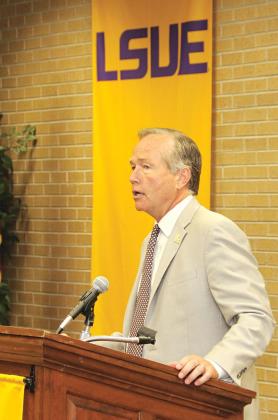
Harlan Kirgan
LSU President F. King Alexander focused on “two wins” involving capital improvements at LSU Eunice rather than $14 million in vetoes.
Gov. John Bel Edwards vetoed $13.5 million for renovations at the science building and $500,000 cafeteria repairs at the Acadian Center.
But Edwards left open the possibility the science building’s heating and air conditioning system will be upgraded as well as $500,000 for a new roof. Those repairs are Priority 2 items in the budget, which are funded only after Priority 1 items.
“We are on the right track and it is getting better,” Alexander said of the state budget and the LSU system.
“The governor has given us a stable platform to work with,” he said.
“It is not everything we wanted, but we will go back the next legislative session and push again,” he said at a greeting session for new LSUE Chancellor Nancee Sorenson on Monday.
“We think the growth of LSUE has a lot do with housing opportunities for further student growth and we are going to be working on that as well as a number of other issues to help do what we’ve already done,” he said.
Alexander also noted the growth of the nursing program expanded through Lafayette General Hospital.
“It is succeeding well beyond our expectations from the beginning,” he said.
Raises for the LSUE faculty and staff will depend on the campus’ finances, he said.
The challenge for LSU has been the several years long drop in state funding that only changed in the past two years, he said.
“He is very committed to higher education,” he said of Edwards. “In fact, we just need to figure out a way to help him get the revenue he wants to to restore the budget in higher education.”
State funding dropped from $8,500 in 2012 to $3,400 per student, he said.
“We’ve got a lot of restoration to make up the ground we lost during that period and the governor is committed to that,” he said.
Funding issues particularly affect the LSU AgCenter, he said, because it does not have a student base other than its 4-H program.
The rice research station in Crowely is standout, Alexander said.
“I think the rice research station at Crowley is just on a great roll in terms of interest level because there is so few left. It is not just that demand is down. The two best rice research stations in this country — the number one is right her in Crowley — number two University of Arkansas has kept their’s and there is one in the Philippines. There is three in the world that are seen as the best research stations in the world.
“So, our Crowley rice research commitment has never been stronger because many of our patented rice products come right out what we are doing in rice research,” he said.
Alexander added that LSU’s sugarcane research is also world-class.
